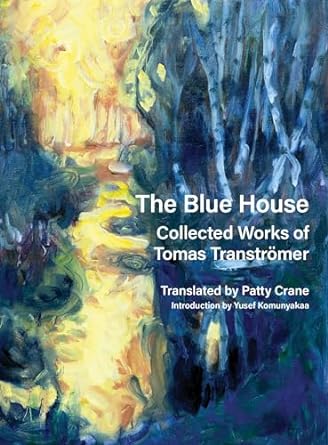
Nobel Prize-winner Tomas Tranströmer explores the personal and political, the ecological and existential, through poems that expand like the widening scope of a telephoto lens. With slow strokes and subtle, rich lines, The Blue Collected Works of Tomas Tranströmer is evidence of a Nobel Prize-winning poet tracing the world with his pen. A stunning testament to an illustrious career, The Blue House gathers poems and writings from Tranströmer’s fourteen collections into a single book. Original Swedish sits alongside their English translations as Patty Crane translates his words into revelatory language acute in the understanding of human change and loss. Subtle in politics and exact in imagery, the poems of The Blue House range from agile haiku to cinematic prose. Social phenomena are observed in rich detail—a “dictator’s bust” presiding over a train car of doomed passengers—and the collection is propelled by empathy and curiosity. Under Tranströmer’s watchful eye, no subject is Milij Balakirev, the Russian composer; Nils Dacke, the Swedish peasant who led a rebellion against the king; and him, the stranger who forgets his name by the roadside. From the personal to the political to the existential, Tranströmer’s poems act as a telephoto lens, granting us reinvigorated access to the world we live in.
Author

His poetry, building on Modernism, Expressionism, and Surrealism, contains powerful imagery concerned with issues of fragmentation and isolation. “He has perfected a particular kind of epiphanic lyric, often in quatrains, in which nature is the active, energizing subject, and the self (if the self is present at all) is the object,” notes critic Katie Peterson in the Boston Review. Critic and poet Tom Sleigh observed, in his Interview with a Ghost (2006), that “Tranströmer’s poems imagine the spaces that the deep then inhabits, like ground water gushing up into a newly dug well.” His honors include the Lifetime Recognition Award from the Griffin Trust for Excellence in Poetry, the Aftonbladets Literary Prize, the Bonnier Award for Poetry, the Neustadt International Prize for Literature, the Oevralids Prize, the Petrarch Prize in Germany, the Swedish Award from International Poetry Forum,the Swedish Academy’s Nordic Prize, and especially the 2011 Nobel Prize in literature. His work has been translated into more than 50 languages. Tranströmer suffered a stroke in 1990, and after a six-year silence published his collection Sorgegondolen (Grief Gondola) (1996). Prior to his stroke, he worked as a psychologist, focusing on the juvenile prison population as well as the disabled, convicts, and drug addicts. He lives in Sweden. On Thursday, 6th of October 2011 he was awarded the Nobel prize in Literature "because, through his condensed, translucent images, he gives us fresh access to reality".